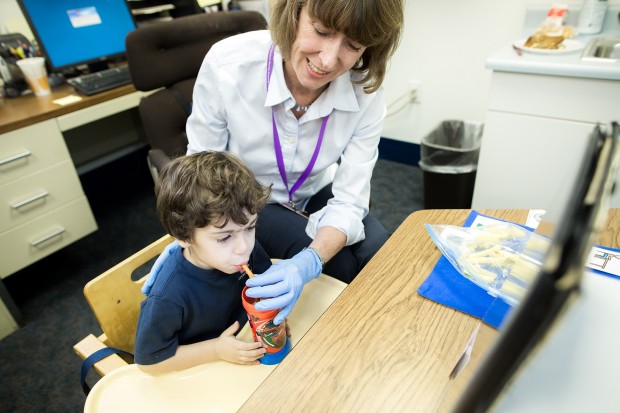Beyond home plate: Equipping Children's Feeding Skills Through Cutting-Edge Treatment Approaches and Progressive Nutritional Support
Are you struggling to help your kid develop healthy consuming behaviors? Discover the significance of very early treatment in feeding challenges and check out innovative techniques for enhancing your kid's feeding abilities. We will certainly also talk about the critical role parents play in their kid's feeding trip.
The Importance of Early Intervention in Feeding Difficulties
You require to recognize the importance of early intervention in feeding difficulties. When it involves feeding problems, addressing them as early as feasible can make a significant difference in a kid's general advancement and wellness. Very early treatment enables for timely identification and intervention, which can prevent potential long-term effects.
By intervening early, you can aid your child develop healthy and balanced consuming patterns and create correct oral motor skills. Feeding challenges can arise from a variety of aspects, consisting of sensory problems, motor skill hold-ups, or clinical conditions. Without early treatment, these difficulties can continue and intensify with time, bring about an array of problems such as poor nutrition, postponed growth, and even mental distress.
Very early intervention additionally makes it possible for specialists to examine and address the underlying reasons for feeding obstacles. They can function carefully with you and your child to create tailored approaches and methods to conquer these difficulties. This might involve applying specific feeding therapy methods, modifying the youngster's atmosphere, or readjusting their mealtime regimens.
In addition to boosting feeding skills, very early intervention can have a favorable influence on various other locations of your kid's growth, such as language and social skills. By attending to feeding challenges beforehand, you can set the structure for your youngster's general development and development, making sure that they have the necessary abilities and self-confidence to flourish. Bear in mind, early intervention is vital when it concerns supporting your youngster's feeding trip.
Recognizing the Function of Treatment Techniques in Feeding Progress
Understanding the role of treatment methods in feeding development is critical for encouraging youngsters with the necessary skills. Therapy methods play a vital duty in aiding youngsters develop the skills they require to enjoy a variety and eat of foods when it comes to feeding challenges. These techniques are made to resolve the special needs of each kid, concentrating on improving their dental motor skills, sensory handling, and general feeding capacities.
Treatment techniques such as oral electric motor treatment, sensory integration treatment, and behavior treatments are generally made use of in feeding treatment. Dental electric motor therapy aids reinforce the muscle mass used for consuming and ingesting, while sensory combination therapy aids children become extra comfortable with different textures, preferences, and smells. Behavioral interventions, on the other hand, concentrate on resolving any feeding-related behavior issues, such as food refusal or hostility.
By applying these therapy approaches, youngsters can progressively advance in their feeding abilities. They discover exactly how to endure different foods, eat and ingest efficiently, and create a positive relationship with consuming. As they end up being extra qualified and confident in their feeding capabilities, they can broaden their food repertoire and take pleasure in a balanced and healthy diet.
General, treatment methods play a vital role in encouraging kids with the useful reference needed abilities to overcome feeding obstacles. With these approaches, children can develop long-lasting skills that will certainly sustain their overall wellness and health.
Exploring Innovative Techniques for Enhancing Feeding Abilities
Exploring ingenious strategies for boosting feeding skills is essential for helping youngsters create a positive relationship with food. One more strategy is responsive feeding, which involves paying close interest to a youngster's hunger and fullness cues. Furthermore, the usage of assistive tools, like special utensils or cups, can assist youngsters with physical constraints improve their feeding capabilities.

Nurturing Nutritional Support for Optimum Development and Advancement
To guarantee optimal development and advancement, it is very important to provide the necessary dietary support for your child. By supplying a well Visit This Link balanced diet, you are providing the foundation they require to prosper. Make sure to include a selection of nutrient-rich foods, such as fruits, vegetables, entire grains, lean healthy proteins, and healthy fats. These foods supply necessary vitamins, minerals, and antioxidants that sustain your kid's body immune system and general well-being.

An additional vital element of nutritional assistance is staying hydrated. Make certain your youngster drinks a lot of water throughout the day. Restriction sweet beverages, such as soda and juice, as they can add to weight gain and dental problems.
Encouraging Parents as Companions in Their Kid's Feeding Journey
Moms and dads play a critical function in their youngster's feeding trip by actively taking part and supporting their dietary needs. As a moms and dad, you have the power to empower your youngster and assist them create healthy eating routines that will last a life time. By actively taking part in your child's feeding trip, you can provide This Site them with the needed support and inspiration they need to check out new foods and structures. You can present a range of nourishing foods and create a favorable consuming atmosphere that advertises healthy consuming habits.

Supporting your youngster's dietary requirements also includes recognizing their specific preferences and dietary needs. Connecting with your child and their doctor can assist you much better understand their nutritional demands and ensure that they are getting the essential nutrients for optimal growth and growth. By being proactively involved and helpful in your youngster's feeding journey, you can equip them to make healthy and balanced food choices and set them up for a life time of excellent nourishment.
Conclusion
In final thought, you have learned about the importance of early treatment in attending to feeding obstacles in youngsters. By recognizing the function of therapy techniques and exploring innovative techniques, we can encourage kids to establish and enhance their feeding abilities. By being involved and proactive, you can encourage your kid to flourish and overcome any kind of feeding barriers they may face (food therapist long island).
Discover the significance of early treatment in feeding difficulties and explore cutting-edge methods for enhancing your youngster's feeding skills.In addition to enhancing feeding skills, very early intervention can have a favorable effect on other locations of your kid's advancement, such as language and social abilities. These methods are made to resolve the unique demands of each youngster, focusing on boosting their oral electric motor skills, sensory handling, and overall feeding capacities.
By executing these treatment techniques, youngsters can slowly proceed in their feeding skills. By recognizing the role of treatment methods and checking out innovative methods, we can encourage children to establish and boost their feeding skills.